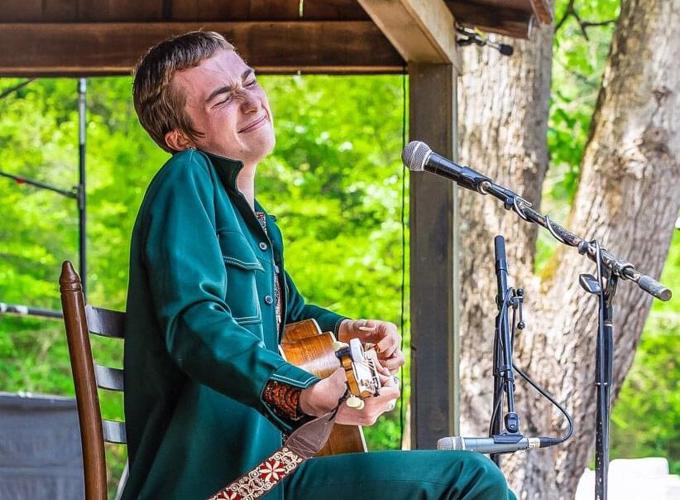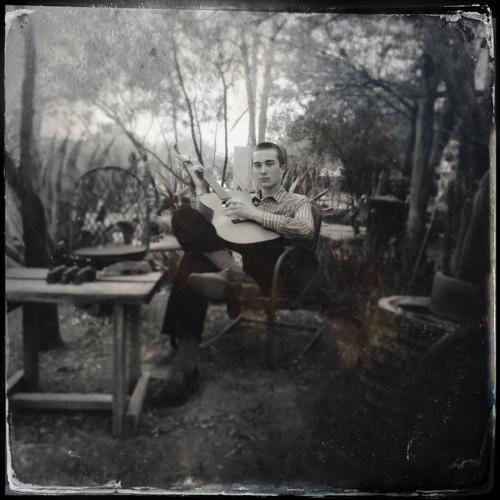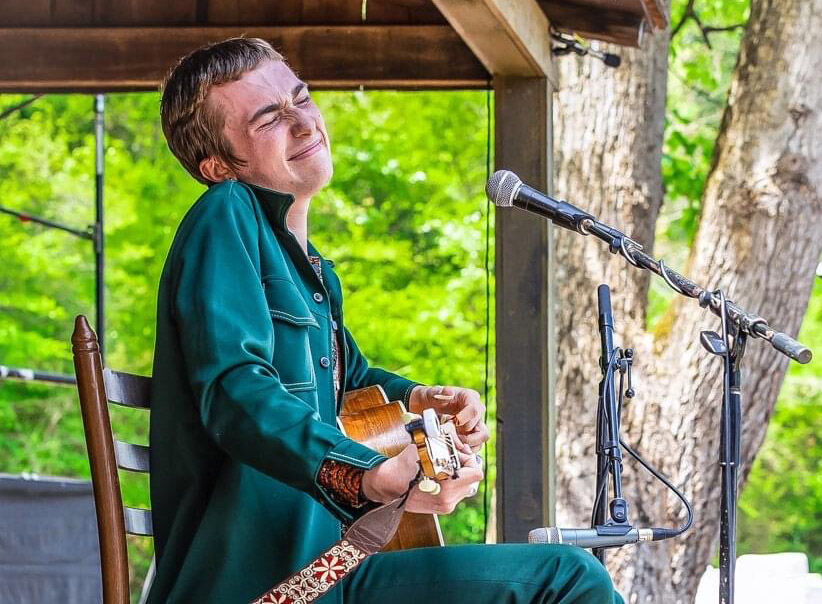Roman Barten-Sherman played his last Tucson show at the MSA Annex last August. He is returning Aug. 19.
Around this time last year, Tucson blues guitar phenom Roman Barten-Sherman played a show at the MSA Annex as he set his sights on school on the East Coast.
He’s back at the annex for a follow-up show on Friday, Aug. 19, with his longtime collaborators Tom Walbank and Ralph White.
But “Future Blues” will show a side of the 19-year-old Tucson native that many of us have never seen when he digs deep into the vault of field recordings by the late Tucson folklorist and Tucson Meet Yourself founder Big Jim Griffith.
“I have this blank canvas that I get the pleasure of filling with all sorts of different strange and beautiful folk music,” Barten-Sherman said last week, days after returning to Tucson from the Port Townsend Acoustic Blues workshop in Washington State. “There’s going to be a bunch of blues going on, but a bunch of Appalachian mountain music and recordings I’ve been working on with Big Jim Griffith from the ‘70s and ‘80s.”
Barten-Sherman spent a year during the pandemic working with the University of Arizona Special Collections Archive to digitize Griffith’s collection of at least 35 quarter-inch reel-to-reel field recordings. The rare recordings, each with between five and 15 songs, date back decades.
“Everywhere he went he had a recorder in hand,” Barten-Sherman said.
Among the musicians Griffith recorded was West Virginia banjo player Bill Hensley, who came to Tucson in the early 1970s. Griffith made the Hensley recordings from the late 1970s to early ‘80s, Barten-Sherman said, and some of them, with the blessing of Hensley’s son, Bill Hensley Jr., are expected to be released this month by the Field Recorders Collective, a nonprofit organization that preserves and distributes non-commercial recordings of traditional American music.
“That’s incredibly exciting to see (the recordings) finally on the precipice of being in the hands of people who will enjoy it and learn from it,” Barten-Sherman said.

Roman Barten-Sherman spent a year during the pandemic working with the University of Arizona Special Collections Archive to digitize Big Jim Griffith’s collection.
“Future Blues” will feature Barten-Sherman playing guitar and banjo — an instrument he picked up during his time with Griffith — and performing old-timey songs from Griffith’s recordings. These are songs that the college sophomore, who is in a dual degree program at Tufts University and the neighboring New England Conservatory of Music in Boston, studied throughout his nearly 18 months with Griffith.
Tucson blues guitarist Roman Barten-Sherman made his debut at MerleFest in North Carolina in April.
“Anytime I brought him some little banjo tune that one could see as so insignificant or small in the scope of how much stuff is out there, he would always find a way to connect it to a thousand other things and really put it in the context of human beings and geography and community,” Barten-Sherman said. “Every time I visited I would always come away with a beautiful laundry list of other rabbits to chase after. … Through that process, he taught me so much about playing the banjo and so much about the voice.”
In some ways, “Future Blues” is a tribute to Griffith, who died in December at the age of 86. Barten-Sherman, who made his debut in April at the legendary MerleFest roots festival in North Carolina, will share some of Griffith’s stories about the connectiveness of music, how blues and folk have commonalities that go beyond similar instruments and styles to a deeper historical connection. Expect to hear Mississippi Hill Country blues that he learned from one of his longtime mentors Jimmy “Duck” Holmes, and Southern Appalachian murder ballads alongside folk music that recalls the past and projects the future.
“I really want to take risks with this show when it comes to the scope of where I will be drawing from,” he said. “I want to explore my own role as an interpreter of these different traditions that is coming from a different place. I’m coming from a very different south.”
Watch now: 'Big Jim' Griffith shares tales of Tucson and beyond
Watch now: Big Jim and the organ pipe cactus
UpdatedJim Griffith discusses the tools and techniques used to harvest the Organ Pipe Cactus.
Watch now: Big Jim's hand carved mesquite tortilla press
UpdatedTucson folklorist "Big Jim" Griffith shares his hand-carved tortilla press as part of the Star's "Our Storied Desert Land" series from 2015.
Watch now: Big Jim answers 'How hot is it?'
Updated"Big Jim" Griffith shares some humorous stories about how hot Tucson summers can get.
Watch now: Big Jim: Harvesting saguaro fruit
UpdatedTucson folklorist "Big Jim" Griffith shares his method of harvesting the fruit of saguaro cactuses.
Watch now: Big Jim talks 'helium monsters'
UpdatedTucson folklorist Jim Griffith shares how a Gila monster can become a "helium" monster.
Watch now: Big Jim and a tale of buried treasure
UpdatedSeveral years ago, Tucson folklorist James "Big Jim" Griffith sat down with the Arizona Daily Star for the "Our Storied Desert Land" video series. In this episode, Big Jim shares a tale of buried treasure in southern Arizona.
Watch now: Storyteller extraordinaire Big Jim tells a tale about crossing the border
UpdatedTucson folklorist "Big Jim" Griffith tells a joke about the border and a moral lesson that can be found in it.
Watch now: Big Jim on chiltepines and how to crush them
Updated"Big Jim" Griffith shows us spicy chiltepin peppers and how to prepare them using a mortar and pestle.
Watch now: Big Jim: Yaqui Easter rosaries
UpdatedIn this 2015 episode of the "Our Storied Desert Land" series, the late Tucson folklorist Jim Griffith describes the role rosaries play in Yaqui Easter ceremonies.
Watch now: Big Jim sings 'Tying Knots in the Devil's Tail'
Updated"Big Jim" Griffith sings a classic song by cowboy Gail Gardner from the book of poems "The Orejana Bull."






